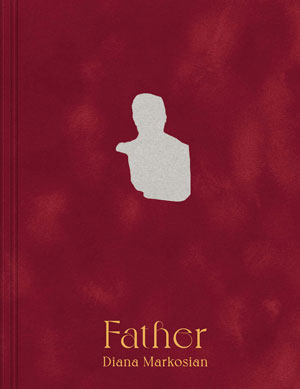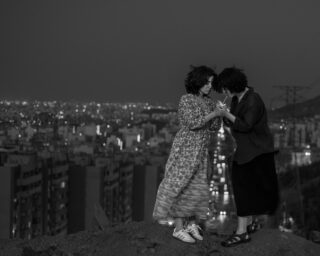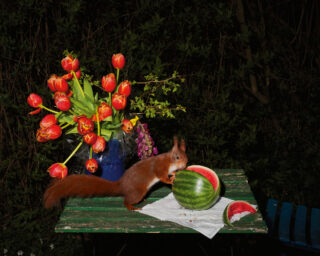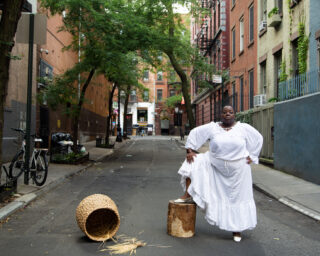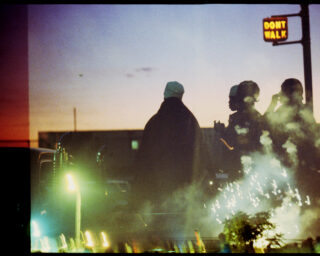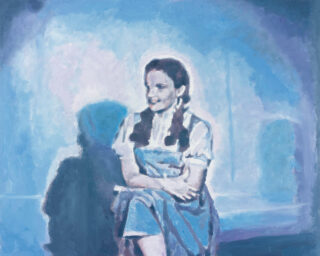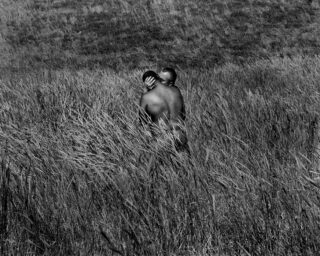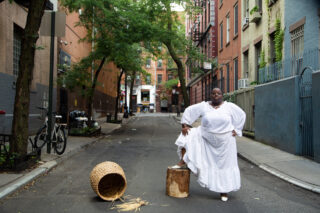The Lives of the Saints by Charles Bowden

David Wojnarowicz, Where I’ll Go After I’m Gone, 1988-89, courtesy the estate of David Wojnarowicz and P.P.O.W. Gallery, New York
Hummingbirds appear before dawn, a whirring and darting at the feeders. Black silhouettes maneuver in the faint gray. The great blue heron alights on the power pole, the sun slips over the mountain.
Delphiniums begin to glow with faint lavender and intense blues. The zinnias come on cheap and crass.
I am just up the river, fifty miles from the killing ground of Ciudad Juárez.
The dead follow me. I sit at a table and put secret graveyards on a map, one I cannot publish because such an act would lead to the murder of my sources.
I listen to the birds, the dead slowly drown out the songs.
I hear stories.
Everything seems normal here with miles of pecan groves lining the river under a blue sky.
But I hear stories.
I read old things with fresh eyes. “People travel to wonder at the height of the mountains, at the huge waves of the seas, at the long course of the rivers, at the vast compass of the ocean, at the circular motion of the stars,” says St. Augustine, “and yet they pass by themselves without wondering.”
The hummingbirds near Patagonia, Arizona, sip almost two gallons at the feeder, then, vanish at dusk. I have come here to erase Juárez from my mind.
I have failed.
The moon rises late in the night hunting through a veil of clouds. Music joins the purl of water wandering the creek and around eight p.m. four men in hoods line up eighteen people in a drug clinic in Ciudad Juárez and kill them. The authorities describe the scene as a river of blood coating the hallway. A chained dog was killed also. Visitors report there is a smell of death in the air.
To the east of me, a rancher is slaughtered.
To the west of me, a border-patrol agent is slaughtered.
And pretty much to the south of me, a seventeen-year-old Mexican guy is slaughtered on the line—the agents say he was throwing rocks.
I listen to songs of New Orleans and plan my exit to the bayous and the brown, sullen waters of the big river. I want to stop hearing the stories, I want to forget, or at the very least, I want to cease to learn.
The river and delta are drugs I need.
Upstream in Arkansas, I am talking to a man painting a wall in an elementary school on the delta. The June air burns. He went up to Detroit in the ’80s, after Nam, after his wars on native ground for civil rights, went up and got into the crack trade and after a while his organization was doing $50 million a year. He wants to write this down, get the killing in Nam down too.
I ask him if he is clean.
He says: “I won’t lie to you, no sir, I am not clean.”
I ask him what he is using.
He says: “Everything.”
I know the feeling. That is why I am on the delta, that is why Juárez seems to keep me on a leash. That is why I keep wanting to hit someone. That is why I just want some peace.
The man keeps painting the wall in the school.
Everything.
But just before dawn as I watch a mouse wander the patio, I realize there is really no way to leave. What I seek is where I am and where I will arrive after all the miles of highway.
One of the hummingbirds at the feeder, a blazing species called Rufous, migrates twelve thousand miles each year, and yet every place it alights finds what it just left behind—insects and nectar to devour. The bird lives in motion to stay where it begins and ends.
The waters of the sea evaporate and wander back to the headwaters as clouds and then the rain falls and the journey down the river renews.
In an hour, the gray light will seep into the sky and a roar will come as they return to the feeders.
Maybe I will wander past myself, full of wonder.
There is the matter of food and drink, also.
There has been a delay because a man sits in front of me and he says that people are sometimes hard to kill.
I feel the door closing behind me and I know it will not be easy to get out of this room.
Once, he explains, he took a contract to murder a very tall and fat man. So when that man entered the room, he hit him in the back of the head with a hammer.
But the man did not go down. He simply turned and said, “Is that any way to greet someone?”
It took a lot of blows to kill him.
The other day I cut catfish fillets, very thin, in the style of southern Louisiana. I washed them in a bath of egg and buttermilk, then dredged them through cornmeal and seasoning.
Another day I rolled out noodles, cut an inch wide with ragged edges. The sauce is made from crushed red pepper, oil, uncured bacon, garlic, tomatoes, cream, pecorino cheese shredded fine.
The need rises. I slice fresh ciabatta, douse with good olive oil, cover with diced tomatoes, anchovies, garlic, garlic, sea salt, and basil. An explosion on the tongue, I uncork the bottle and watch the moss draping down from the trees by the swamp slowly sway.
Such things are not details if you go down by the river.
You must learn to say yes before you can endure the people who say no.
The other day a man told me my problem was simple: I had never been tortured.
When I started out, I planned to farm and eventually die surrounded by the fields and fat cattle. The raw smell of red clover in the meadow has been the fragrance I wished to wash over my life.
In the third or fourth century A.D. an old man dies in North Africa and leaves this epitaph: “Here lies Dion, a pious man; he lived eighty years and planted four thousand trees.”
I wanted to be like that man. He almost certainly planted olive trees, a featured crop of the region. The early fathers of the African church had abundant light for their lamps and could write the mysteries of the faith all night long to the envy of their Italian colleagues.
But there was a chance in the air at the same moment when Dion left his summary of his life. St. Jerome, looking out at a small child, sketched this view of that world: “In such a world Pacatula has been born. Disasters surround her as she plays. She will know of weeping before laughter. . . . She forgets the past; she flees the present; she awaits with eagerness the life to come.”
I live between my Rome and my Jerusalem: my Ciudad Juárez and my New Orleans. Except that neither one is a holy city. And both cities are dying and both cities kill and both cities draw me toward them. And both cities have been written off and in both cities faces without names are writing the future with blood.
I have ignored God or the questions about God since I first walked into the forest and desert. The saints I spent time with in my twenties, when I inhaled drugs and for a spell thought the saints were the fellow outcasts and outlaws of their time. I swallowed whole St. Augustine and St. Jerome, also St. Anselm, St. Thomas Aquinas, Meister Eckhart, St. Teresa, St. John of the Cross. And the little flowers of St. Frances of Assisi, especially his time with the wolf. I paid no attention to Christ and Jehovah.
Now in the bright light of a new day as the killing comes down and the ground cracks underfoot, I return to these holy bones stored on dusty shelves in scorned libraries. I blow the cobwebs off, and St. Augustine tumbles down and rests in my hand again.
In an earlier time: The light falls golden, the air sags with moisture and the bayou is still, the waters green and placid. There is a war in Korea, and willing dead men leave this place to join that war. There is always a war during my time on earth, and always a ready supply of willing dead men. Bird cries shred the sky. Food floats from the kitchen: a gumbo with shrimp, andouille, celery, onion, bell pepper, filé, and a very dark roux. The blackened-iron kettle rests on the stove as my aunt stirs, a cotton wrapper clinging to her abundant body. Scents fill the air: her perfume, the gumbo, the swamp smells coming through the screen door.
The land here is flat and mainly underwater. The flatness, a land form I will later learn is called a delta, extends upriver almost to my birthplace in Illinois. Clay at the top, black mud at the bottom. Nasal speech in Illinois, and a mixture of Irish dock accents and rich southern vowels where the waters begin to break free and taste the salt of the sea.
I remember all the furniture in the house on the bayou is veneered with rounded corners and the mirrors are oval. The bedsteads are also veneer, the cigarettes have no filters, and the women leave the red imprint of their lips on the spent stubs. Salt, cayenne, garlic, and green scum on the water. I have always welcomed the night, that darkness rich and stuffed with hidden things. The dawn, also, and the early morning. The rest sometimes seems too bright for seeing things.
I never asked questions. My aunt in the swamps, I don’t know her maiden name. She had a twin sister who died. There was no money, and my earliest memory is of her doing piecework at a sewing machine in a sweatshop. She also held a soft-shelled crab up to my eyes and then later at home pan-fried it and I held it in my child’s hands and ate it like a large cookie.
There have been some questions. I will answer.
What possible link is there between the great delta of the Mississippi River and the poverty and violence of Ciudad Juárez?
Answer: The delta of the Mississippi River is the richest land on earth and for two centuries it has produced the poorest people in the United States. Ciudad Juárez was to be the model for American free-trade theories and for decades it has produced corruption, poverty, and violence.
If you ask what food and cooking has to do with all this, then you do not understand appetite and if you do not understand appetite you will be baffled by love, violence, and death.
I have always been interested in how things get done and so people tell me of their skills and trades and toils and the hazards of their work. The man I spoke of worked at killing people and burying them in Juárez. Sometimes, rotten bodies must be dug up and moved in order to preserve public order and respect for the state.
The skin blisters and the doctors try to understand. They wonder if it comes from work in the chemical industry or some other kind of intense contact. When asked, the patients pause. There is no way to discuss the matter. When a body has been underground a while, the rot advances, especially when lime accelerates decay. And then an order comes to move the bodies, sometimes without any reason. Sometimes because it is discovered that the house has been leased from a significant political figure. And for the owner to have his patio returned with corpses underneath the dirt as he sips his morning coffee and goes over the newspapers, that would be an insult. Despite the best efforts—deep holes, lime, layers of concrete—there is often a seepage of gases through sudden fissures in the soil. It might be evening, a beer cold in the hand, the patio inviting and suddenly there is a layer of odor floating and it is death. This cannot be allowed. Decorum must be observed. The owners, when they occupy their fine houses, should not have to smell death. Such an experience would upend the meaning of money and privilege.
So the bodies must be moved. There is not always time to round up the Hazmat suits. There are chemicals. And then, over time, an intolerance, maybe something called an allergy, that visit to the doctors, the question: Have you worked with chemicals?
This question can be awkward.
Last night, the creek rose and the water went brown with runoff from the hills. Drops fell softly from leaves, the clouds parted after the storm and a waning moon wandered among the stars. The bats hunted insects and came close to my face.
I was twenty miles from the border in Arizona at that exact moment. I felt I was going to where I belonged.
This afternoon, during a brief break in the storm, the sun streamed down on the sunflowers, some yellow, some red and bronze, and the dirt rose up like incense. Yellow, black, and blue butterflies fluttered around and did not fear me.
These are surely signs and I must learn to read them.
St. Augustine became a Christian when he heard a child’s voice singing as he sat in a garden on the edge of the Alps. He raced into the villa, opened St. Paul’s Epistles and saw the line “Not in reveling and drunkenness, not in lust and wantonness, not in quarrels and rivalries. Rather, arm yourself with the Lord Jesus Christ, spend no more thought on nature and nature’s appetites.”
I would not wish his fate on a dog. I cannot imagine what it is like to spurn nature and nature’s appetites.
A young bobcat lives in the bamboo, kills doves in the yard and is willing to look into my face.
In the light rain, a javelina crosses the road in front of me.
Two buck deer emerge from the tall grass by the lane.
The great blue heron fishes the waters and pays me no mind.
Spiders now live over the stove and hang down when I make coffee.
I can sit in public cafés and not be noticed.
When I shop in the market, no one calls the police.
A black bear and cub scavenge the abandoned apple orchard in the bottomland.
There are fireflies after the night falls down.
All the saints seem to see the world as a barrier to their spiritual lives and personal salvation. They find personal salvation more important than the world itself. And they find women to be a menace to their souls.
This is clearly the best case that can be made for seeking damnation. Heaven and Hell do not concern me, nor does the state of my soul. Scorning the world is beyond my understanding. Why be here then?
A faint shower last evening brings up the raw scent of the grass come morning. The sun rises as a disk of gold, the hummingbirds descend with lust in their hearts, acorn woodpeckers pillage the feeders and a vulture sits high in the cottonwood across the wash and basks in the early light. A great blue heron flaps across the sky.
I am always puzzled when I am told life is meaningless.
I am always puzzled when I am told the meaning of life.
I have decided to take all the theories of violence, snap them across my knee and toss the fragments away. All this because my hands are rank with the strong scent of tomato leaves and the sunflowers have seared golden circles into my eyes. The hummingbirds let me stand two feet from the feeder and pay me no never mind.
I have decided to learn from appetites. I will slobber and drool and chew and inhale. I am done with dainty feeding. The quick and the dead share one thing: appetites. They both want to consume things. The theories assume there is a normal world where violence is absent. I see a world of appetites where the thing called violence answers yet one more hunger. Maybe it is the new fast food for those who do not have time for fine dining.
I have decided to drink cold water, eat black pepper, and listen to the stars on black nights.
I have decided.
I am not a camera.
I am not a theory.
I am a hunger.
St. Augustine says: “Some people, in order to discover God, read books. But there is a great book: the very appearance of created things. Look above you! Look below you! Read it. God, whom you want to discover, never wrote that book with ink. Instead, He set before your eyes the thing that He had made. Can you ask for a louder voice than that?”
The saints must keep up appearances.
I have decided.
_____
“The Lives of the Saints” was originally published in Aperture magazine issue #205, Winter 2011.




